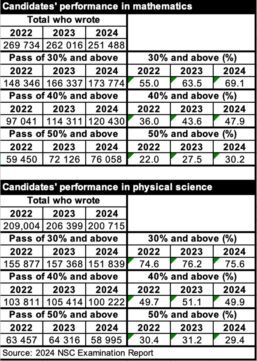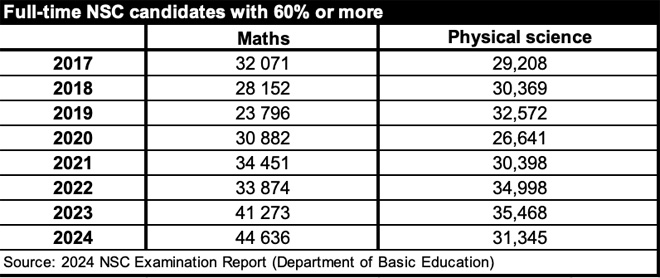The Minister of Basic Education, Siviwe Gwarube, has expressed concern about the decline in the number of matric candidates enrolling for subjects that are more likely to open doors to high-paying careers and are critical for the country’s economic development.
Gwarube made the comments in the foreword to her department’s report on the 2024 National Senior Certificate (NSC) examination, the results of which were released this week.
The pass rate for learners who wrote the NSC examination administered by the Department of Basic Education (DBE) increased from 82.9% in 2023 to 87.26% (or 615 429 learners) in 2024, which is the highest pass rate since the advent of democracy in 1994.
The total number of full-time learners who wrote matric in 2024 rose to 705 291, up from the 691 152 who wrote the exams in 2023.
But the report also shows that the number of candidates who sat exams in subjects required for university courses in science, technology, engineering, and mathematics (STEM) fell compared to 2023.
Many high-demand, well-paying jobs are in STEM fields, such as data science, software engineering, biotechnology, and medicine. Acquiring STEM skills increases employability and provides access to dynamic and rewarding careers.
A STEM-educated workforce is essential for adapting to automation and artificial intelligence, which are reshaping many industries. Maths and physical science are gateway subjects for students who want to pursue degrees in STEM disciplines.
The report shows that the number of candidates who wrote maths (not maths literacy) fell from 269 734 in 2022 to 262 016 in 2023 to 251 488 in 2024. The number of candidates sitting the physical science exam rose from 125 770 in 2022 to 127 035 in 2023 but fell to 124 686 last year.
Gwarube said that recently released international benchmarking studies, including the Trends in International Mathematics and Science Study (TIMSS) and the Southern and East Africa Consortium for Monitoring Educational Quality assessment, as well as her department’s South African Systemic Evaluation results, show that South African learners in Grades 5 to 9 significantly underperform in relation to their global counterparts in maths and science. These studies also show that many learners cannot read for meaning in any language by Grade 4.
The consequence, Gwarube said, is that many learners progress through the basic education system without mastering foundational skills, particularly in literacy and numeracy, which are critical for performing well in gateway subjects, such as maths and physical science.
“These deficits accumulate over time, limiting learners’ abilities to succeed in higher grades and in these gateway subjects and diminishing their prospects of accessing further education and employment opportunities. This trend manifests itself in the perennial decrease of enrolment in subjects such as physical sciences, mathematics, accounting, and economics, which are all subjects that are critical for a nation’s ability to advance in science, innovation, and economic development.”
In response to these trends, the minister said her department will embark on an urgent strategic reorientation of the system towards strengthening foundational learning. Furthermore, provinces, districts, and schools must compile plans to arrest the decline of enrolment in critical subjects.
“The systemic interventions that we will undertake in this regard include expanding access to quality Early Childhood Development for learners before they enter the basic education system and improving the quality of teaching and learning in the Foundation Phase.”
Learners need to achieve at least 60%
Of the 251 488 candidates who wrote maths, only 30.2% attained a grade of 50% and above, an improvement from the 27.5% in 2023 and the 22% in 2022.
Of the 200 715 learners who wrote physical science, 29.4% scored 50%, which was lower than the 31.2% in 2023 and the 30.4% in 2022.

Learners who do not obtain at least 60% in maths and physical science may struggle to be admitted to university degree courses in STEM disciplines, and the DBE set a target of 35 000 learners scoring at least 60% in maths and physical science in 2024.
The DBE report states: “The Department of Planning, Monitoring and Evaluation (DPME) has set national targets for the number of Grade 12 learners achieving marks in mathematics and physical sciences required by university faculties, such as engineering, commerce, and medicine. Previously, DPME’s targets focused on achieving a 50% mark in the two subjects. In the 2019 to 2024 Medium Term Strategic Framework (MTSF), the country’s five-year plan released in 2020, the threshold was raised to 60%. The thresholds 50%, 60%, and 70% are important as they are all used by universities, depending on the institution and faculty concerned.”
In the 2024 NSC exam, the 35 000 target was exceeded in the case of maths but missed in physical science.
Of the 251 488 learners who sat the maths exam administered by the DBE in 2024, 44 636 (17.4%) attained 60%. Of the 200 715 candidates who wrote physical science exams, 31 345 (15.6%) scored at least 60%.

The DBE’s report attributed the fluctuation in candidates achieving 60% or more from 2016 to 2014 largely to slightly varying levels of difficulty in the exam papers over time.
It noted that the 2019 to 2024 trend in physical science achievers has been much weaker than the trend for maths. This was in line with the improvement in the Grade 9 TIMSS results for maths between 2019 and 2023, whereas the science result declined. This could reflect the fact that the pandemic-related school disruptions did more harm to physical sciences than maths, given the reliance of the former on equipment and demonstrations in a face-to-face classroom setting.
The report said although it is encouraging that the MTSF’s targets have been partially met, it is clear that high-level achievement in maths and physical science continues to be a serious challenge in the schooling system. Specifically, higher numbers of learners achieving, for instance, 60% in the two subjects is needed to address skills shortfalls in the labour market, which slow down the prospects for higher economic growth.
The performance of candidates who sat the NSC exams administered by the DBE is in contrast to that of learners at schools offering exams administered by the Independent Examinations Board (IEB).
A total of 8 867 candidates wrote the IEB-administered maths exams, of whom 95.9% passed at the 30% threshold, and 64% attained 60% or higher. In physical science, there were 5 661 candidates, 95% of whom passed with 30%, and 55.4% attained 60% or higher.
Not what the universities require
The percentage of candidates achieving admission to Bachelor studies improved to 47.8% (337 158 learners) in 2024 from 40.9% in 2023.
For candidates to be admitted to Bachelor studies, they must obtain 40% in their home language, 50% in four other subjects (excluding life orientation), 30% in the language of learning and teaching, and 30% in one additional subject. Additionally, candidates must pass at least six of the seven subjects.
The DBE said the ongoing increase in the number of school-leavers with an NSC qualifying them to study at a university is a major achievement that provides more young people with opportunities and hope.
It also noted that the annual intake of universities is less than half the number of learners with an NSC permitting university studies. However, it is estimated that about two-thirds of first-year university students are subject to admissions requirements that include minimum marks in maths but also, in many instances, physical science. In this sense, the schooling system under-supplies what is needed to some extent.
“Universities are thus forced to relax mathematics and physical sciences requirements in the case of some students in order to reach enrolment targets. Ideally, there should be enough applicants at universities with marks in the two subjects which are well above the minimum thresholds. This would, among other things, improve the ability of university students to progress through their university studies,” the report said.



